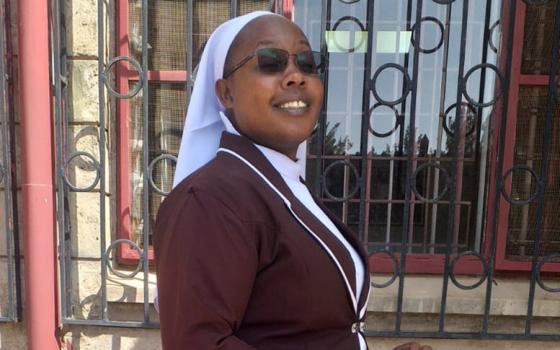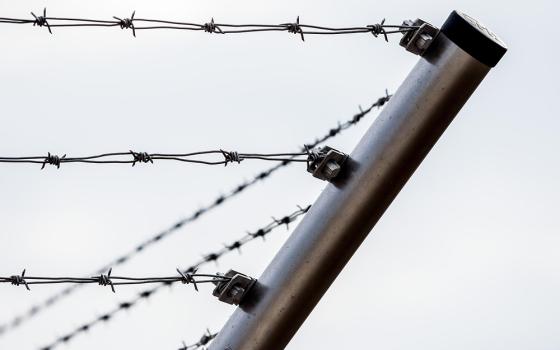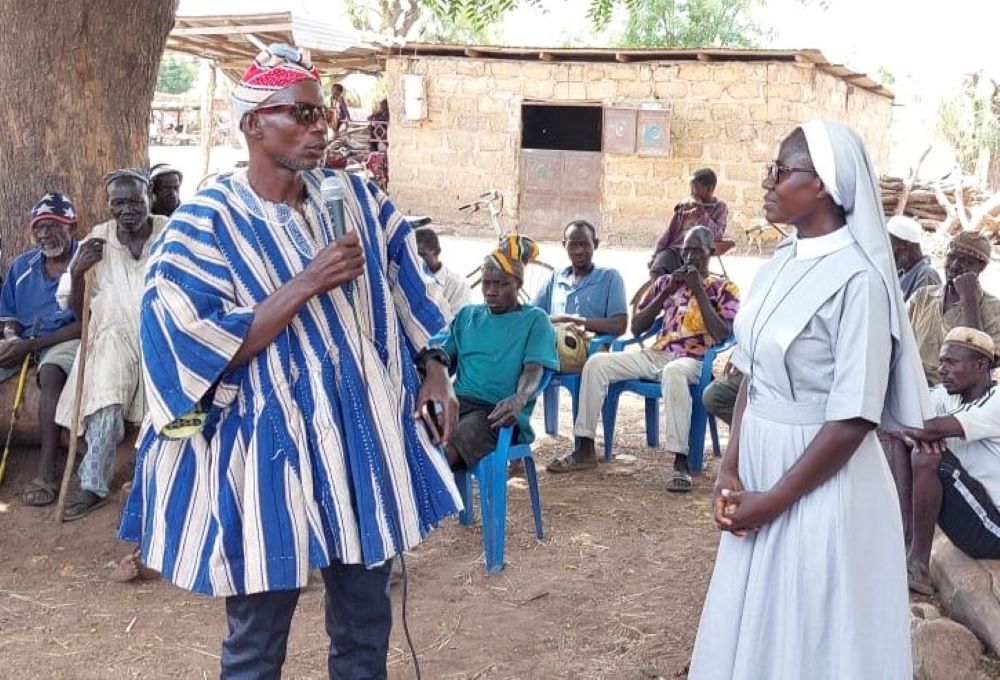
A sister participates in a community engagement session run by the Africa Faith and Justice/Ghana Network. The program aims to educate people about the harms of early or child marriage and find ways to end this longstanding tradition. (Courtesy of Eucharia Madueke)
Editor's note: A version of this column previously appeared here on the website of the African Faith and Justice Network.
Early marriage, a long-standing practice that violates the rights and the dignity of the girl-child, is prevalent in many African communities. It exposes girls to premature death from disease or complications from early pregnancy and loss of childhood years; lack of education and skills trap them and their children in poverty conditions to the detriment of their community.
Africa Faith and Justice Network, or AFJN, and our coalition network in Ghana are tackling this practice. Catholic sisters, through community engagement, are targeting entrenched mindsets and cultural practices that have sustained this practice. Communities are accompanied and given facilitators to reflect together, and are encouraged to take bold steps to deal with the root causes of this practice. We believe in the agency of the community to tackle what they are convinced is a problem, and that with sustained education, grassroots engagement, and targeting local community leaders, these communities will work together to end this practice
Studies show that 15 of the 20 countries with the highest rate of child marriage are in Africa. In sub-Saharan Africa, 40% of girls marry before age 18, while in West and Central Africa two girls out of five marry before age 18. In Ghana, 1 in 5 girls marries before the age of 18, and 1 in 20 marries before her 15th birthday. In Northern Ghana, 2 in 10 girls marry as children; 1 of 3 marry before age 18.
To stem the tide of this practice in Africa and its negative consequences on the individual, the African Union launched a "Girls Not Brides" continental campaign in 2014. But the practice continues.
Thanks to funds from the Conrad Hilton Sisters Initiative program, in November 2022 we began with a four-day training workshop on social analysis and advocacy, at the pastoral center in Tamale, Ghana. (The Conrad Hilton Foundation is GSR's major funder.) Participants included 30 religious men and women and 40 others of varying age, sex, religion and profession, representing selected local communities. The workshop provided information on early marriage and formed a network of capable stakeholders to work with local communities to tackle this challenging practice.
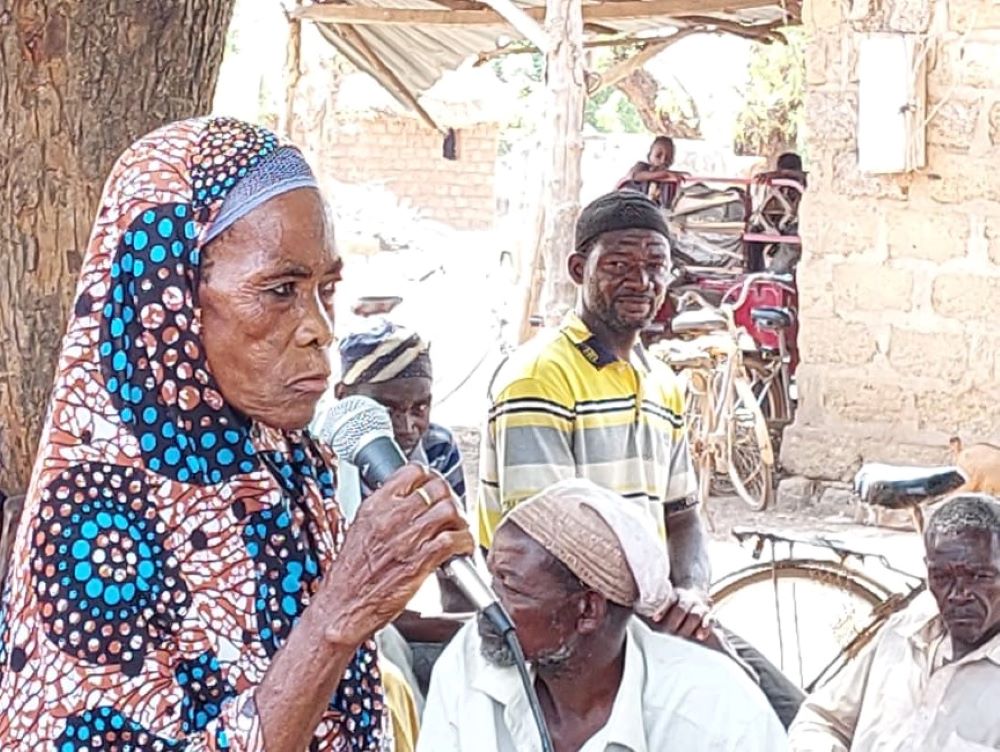
A community elder speaks during an event focusing on the ways to end child marriage, a long-standing practice in Ghana and other parts of Africa that violates the rights and the dignity of the girl-child. (Courtesy of Eucharia Madueke)
The workshop allowed participants to share their knowledge and personal experience of child marriage and the ways it is practiced. Participants examined child marriage from religious, economic, cultural and social dimensions, including the examination of government interventions. Presentations by experts, including the chief of police in Tamale, and two victims of this practice, opened participants' eyes to how deep this practice is at the community level and how a sustained grassroot engagement with affected communities is needed to end it.
Participants agreed that government legislation needs to be accompanied by support for local communities to tackle this problem themselves. Agreeing that it would require sustained effort to change the entrenched mindset sustaining this practice, participants pledged to work with women and men religious under the umbrella of AFJN-Ghana to engage the local communities.
Currently, the network is engaging adults, youths and children in six communities in three districts of Tamale. They conduct social analysis and hold town hall meetings on early marriage, provide space to share personal experience of early marriage, and facilitate discussion of this practice — including ways to end it. Our network adopted a slogan: "We bring you nets to fish and not fish to eat."
This slogan — developed at our first workshop — encourages communities to look inward for solutions. Participants expected us to provide "a handout" or promise of social amenities in their communities (based on the practice of other NGOs that have visited them), but the slogan counters this mindset from the beginning.
We are already seeing some results from the first five months of engagements. Communities clearly recognize the harm — physical, economic, social and emotional — that early marriage brings to individuals, families and communities. They are now connecting early marriage with family breakdown, poverty, underdevelopment and other ways it undermines family and community lives.
For instance, one older man said his marriage to a 13-year-old girl did not help build a solid family. It was very difficult for him to hold a reasonable family discussion with her. "She could not even raise our children in a proper way and now our children have grown wild and hardly listen to us," he said.
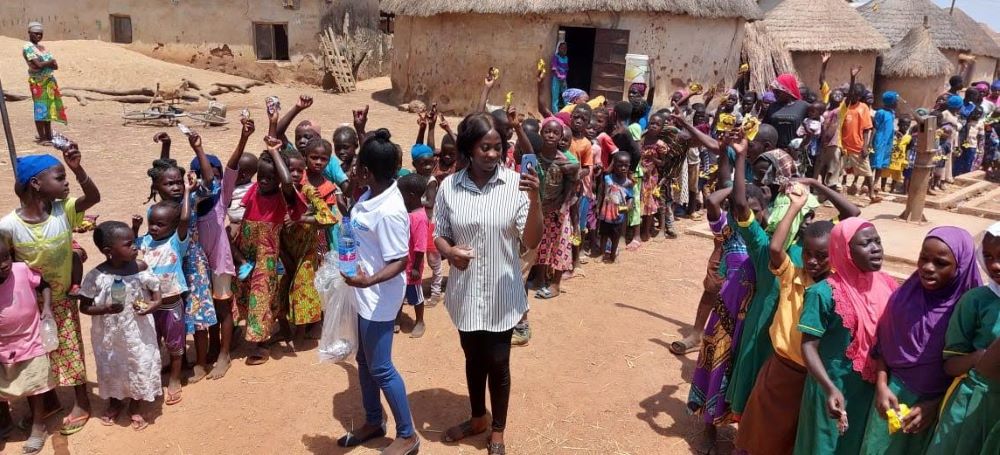
A community elder speaks during an event focusing on the ways to end child marriage, a long-standing practice in Ghana and other parts of Africa that violates the rights and the dignity of the girl-child. (Courtesy of Eucharia Madueke)
Another elder shared how early marriage perpetuated poverty in his family. He lamented; “I have 10 children with my wife whom I married at a young age. We worked hard but we have nothing to show for it. We did not send our children to school. We married the girls off young thinking that life will be better for them and for us.”
He continued: "My entire family is suffering. My children, their husband and my grandchildren all depend on me. Now, my children are marrying their girls off hoping for a better life. I advise them and they do not listen. We want this practice to stop so that we will have money to send our children to school so that they can get good job, else we will never have a better life."
Convinced of the negative impact of early marriage, the communities so far have begun to tackle some issues they perceive contribute to early marriage. First, the communities have banned a long-standing "record dance program" — unsupervised weekly all-night dances for youth.
The communities believe that ending this program will help reduce the high rate of teenage pregnancy that often leads to early marriage. A community leader said: "Our young boys and girls will no longer go out in the night to jump and dance and come back to us pregnant."
As an alternative to the dance program, we have introduced clubs where the youth meet every week for sports, literacy education and other social skills. It is heartwarming to see older youth share with others the few math and English skills they have acquired. This program, still in its "teething stage," is intended to support and protect young people from early marriage by encouraging them to go to school rather than get married. We believe that with more funding to develop and support these youth activities, the clubs will bear positive fruit in these communities.
The communities have also begun mandatory weekly family meetings where parents and their children meet for conversation on family matters, including discussions of early marriage. This is a step they hope will help to strengthen family life. These communities attributed the high rate of early marriage to breakdowns in family values and relationships. They lamented that parents do not have time for their children, and children no longer listen to their parents.
Advertisement
We are delighted about these meetings and believe they build family relationships, understanding and better decisions. To further strengthen families, we have included education in parenting skills. Even this undeveloped program is highly appreciated in these communities.
Acknowledging the importance of education, these communities are openly encouraging young girls who married young to go back to school. Many of these girls — supported by their parents, husbands and the entire community — are eager to return to school. One elder said, "We want our girls to go back to school because we want to be the first community to have many graduates; we want female ministers and doctors and lawyers."
Currently, we have 18 girls eager to go back to school, and we have secured a school where they can go as a group for remedial programs. Given the high rate of poverty, though, they will need financial assistance.
These young mothers have a genuine desire to return to school. We strongly believe that education will change their lives and the future of their families, and hope that financing their education will not be an obstacle. Investing in them will also help prepare future community advocates against early marriage.
Concerted effort is needed to end child or early marriage, which particularly harms the girl-child and her community. Our engagement has led the communities to work together to tackle the issues sustaining this practice. They are excited for the chance to tackle this ages-long practice that is so detrimental to them.






